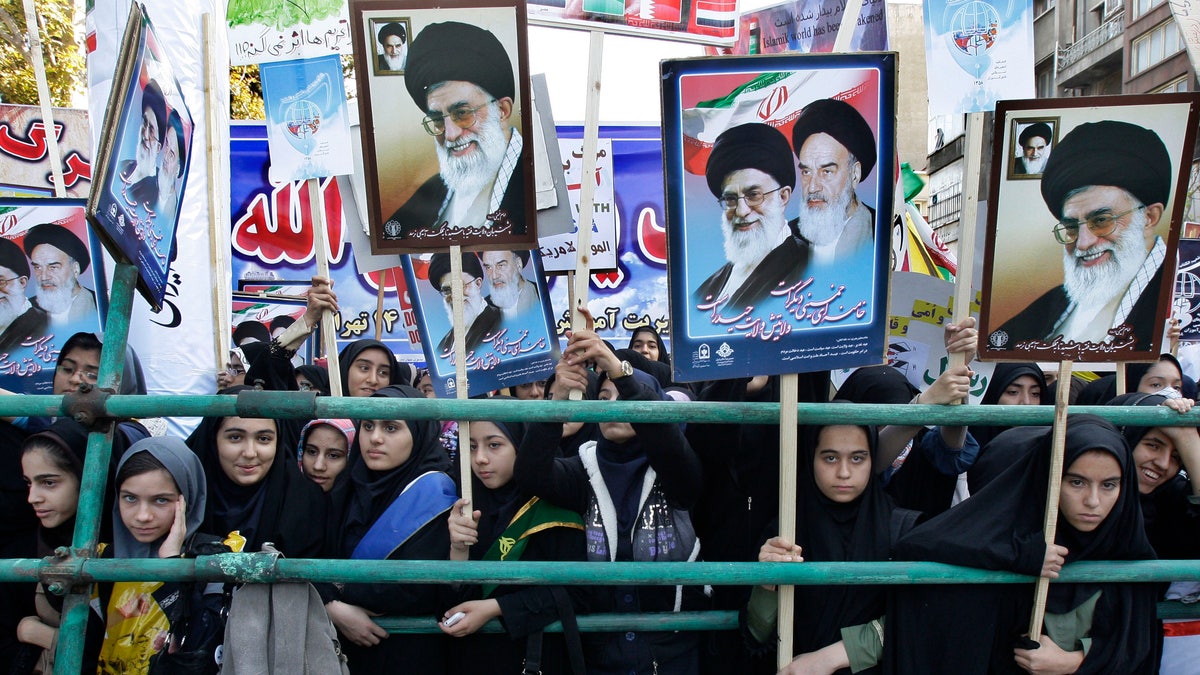
Nov. 2, 2012: Holding posters of the late revolutionary founder Ayatollah Khomeini, and Supreme Leader Ayatollah Ali Khamenei, Iranian girls attend an annual state-backed rally in front of the former US Embassy in Tehran, Iran. The rally marks the Nov. 4, 1979, storming of the building by militant students who held 52 Americans hostage for 444 days to protest U.S. failure to hand over the toppled shah Mohammad Reza Pahlavi to Iran for trial. (AP)
Ben Affleck's recent film "Argo," which is about the escape of six Americans who were serving in our embassy in Teheran when radical supporters of Iran's emergent Islamic Republic seized it in November 1979, is an engaging escape from reality. Of course, that's fine for entertainment, which "Argo" provides very ably and generously.
Daring CIA personnel smuggle the six understandably fearful embassy staffers from Iran despite great odds. What a thrilling victory for the good guys!
But America lost in the real event, which marked the beginning of modern terrorism. The biggest losers certainly were and remain those who were kept prisoners until late January of 1981: 52 of us, together with our families.
Not surprisingly, the former hostages, who are alive these 33 years later, still suffer symptoms of the physical, psychological and emotional pain of the 444 days.
[pullquote]
Days were spent in degrees of darkness. Many tortured, blindfolded and put through mock executions, others living in isolation, constraint and overwhelming fear with not so much as a breath of fresh air from the outside world.
Our captors, let's understand, were infuriated by eager American support of Shah Mohammed Reza Pahlavi, whose totalitarian state practiced horrific violations of human rights for 25 years.
Resistance to his regime in some ways culminated in the seizing of our embassy and the birth of Ayatollah Khomeini’s equally repressive Islamic state, which continues as one of the most serious challenges to American foreign policy.
This in no way salves the alcoholism, PTSD, and emotional disconnect continuing to plague the hostages and which so recently lead one hostage to take his own life in order to release the pain and bitterness. No doubt memories of the experience will be embedded in our consciousness forever.
In my case, counseling and therapy provide some temporary relief from my third decade of sleeplessness, relentless anxiety and, lately, severe panic attacks.
I will live the rest of my life as a permanent victim of terrorism.
The recent tragedy in Benghazi, where American ambassador Chris Stevens and three others were murdered adds to the sad evidence that more terrorism against American embassies and consulates is to be expected.
What to do about it?
One of the steps taken after the 444 days spent in abject terror by us kidnapped and tortured diplomats was the signing the "Algiers Accords," so called because they were brokered by the Algerian Government, that resulted in our release from our long nightmare.
The Accords reinstated American banking and construction interests by arbitrating their claims against Iran through the United States Claims Tribunal. The industries were thus protected, but not the hostages, who were banned from the systems of justice by the terms of this agreement.
But Congress has now acted and asked our government to fulfill some of the 33-year-old promises made before we were released. A bipartisan House Resolution (H.R.) 5796, the Justice the American Diplomats Held Hostages in Tehran Act, is now under consideration. With 69 co-sponsors, it proposes establishment of a “common fund to pay claims to the Americans held hostage in Iran, and to members of their families.”
One of its attractive features is not asking the American public to pay a penny of the compensation, which will come entirely from the sanctions currently imposed on those criminal commercial ventures that illegally do business with Iran.
We hope its passage will send a message to those who serve our country as diplomats that their rights are worth protecting.
